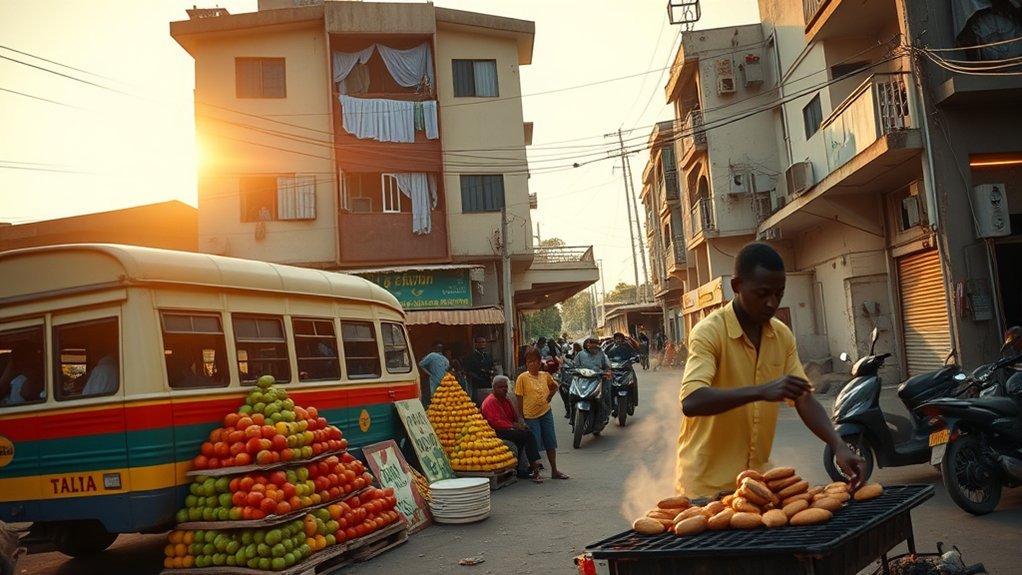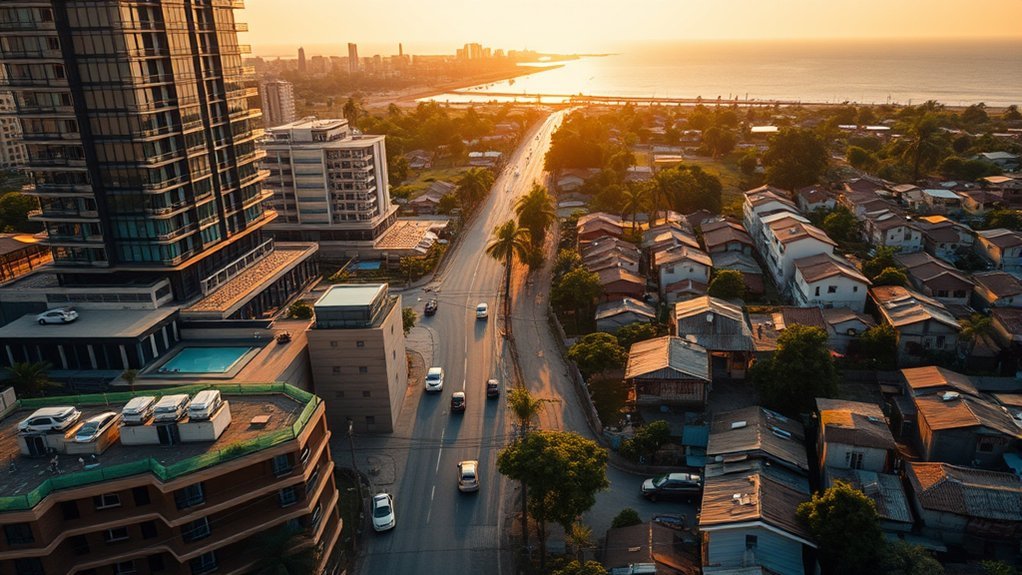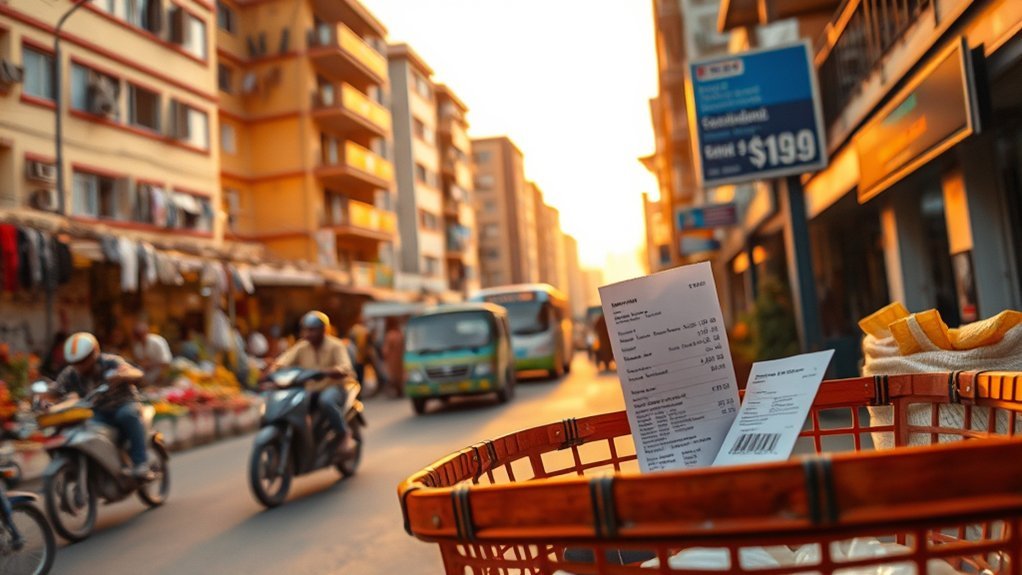You can live modestly in Tanzania on about $250–$350 a month, while a comfortable city lifestyle typically costs $600–$1,300. Average monthly pay is roughly $259 and minimum wage $61. Rent for a one‑bedroom city flat averages $303, utilities about $70, and a meal costs around $2.50. Transport fares are about $0.30. Housing takes roughly 23% of local incomes and mortgage rates run high, so keep reading to see how these figures affect daily choices.
Living Costs Snapshot: Key Numbers and What They Mean

Although overall living costs in Tanzania are low by international standards, key figures show significant local strain: the average monthly salary is about $259 while the minimum wage is roughly $61.50, and the country’s Cost of Living Index sits at 30.8. You’ll see a stark gap between income and essential costs: rent for a one-bedroom city-center flat averages $302.64—already above the typical monthly salary—and utilities add roughly $70.39. That mismatch compresses disposable income and limits upward mobility, even though consumer prices (for example, a $2.57 restaurant meal) remain low compared with wealthy nations. When you assess Cost of Living and standard of living together, the data reveal constrained choices rather than comfort for many. If you’re seeking liberation, these metrics show where pressure points lie: housing and utilities absorb disproportionate shares of meager pay, leaving little room for savings, investment, or economic escape.
Everyday Expenses: Food, Transport and Utilities

Having seen how housing and utilities squeeze typical incomes, let’s look at everyday spending where you can find more breathing room: food, transport and basic services are markedly cheaper than in the U.S. You’ll pay about $3.32 for a lunch menu and $19.90 for dinner for two—versus $19.50 and $76.50 in the U.S.—so eating out stretches your budget further. Grocery basics reinforce that freedom: 1 L milk at $1.15 and 0.5 kg bread at $0.84 compare favorably to U.S. prices, especially on staples. For transport, one-way fares run about $0.30 and a monthly pass $15.70, far below U.S. $2.35 and $69.50, letting you move around without high costs. Your monthly utilities average $76.70 versus $193 in the U.S., and internet at roughly $38.30 for 50+ Mbps vs. $67.50 keeps connectivity affordable. These differentials give you practical leverage to allocate income toward savings, projects, or experiences that build independence.
Housing and Rent: City Centre Vs Suburbs

When you compare city and suburban options, rent in Tanzania is strikingly lower than in the United States: a one-bedroom in a Tanzanian city center averages about $302.64 (versus much higher U.S. rates), while suburban figures—reported around $1,321—suggest wide variation across locales; overall, Tanzanian rents run roughly 81.6% below U.S. levels, yet housing still consumes about 22.8% of local incomes and high mortgage rates above 20% keep ownership out of reach for many.
You’ll find clear trade-offs: city-center housing gives you lower absolute rent for compact living—$302.64 for a one-bedroom or about $706.80 for a three-bedroom—while suburban options can be costlier in some areas despite offering more space. For someone seeking liberation from high fixed costs, choosing central rental units preserves mobility and reduces monthly outlays. Factor in limited mortgage access and prioritize flexible rent choices that align with your goals, since owning is expensive and often impractical under current cost of living conditions.
Earnings, Salaries and Purchasing Power

If you earn the average monthly salary of about $258.96 in Tanzania, you’ll find it dwarfed by the U.S. average of $4,336.80, leaving far less room for discretionary spending and savings. Your earnings and salaries are compressed: the national minimum wage is roughly $61.50, so many households live on precarious incomes. With a cost of living index at 30.8, prices are lower nominally, but your purchasing power remains constrained. Food alone consumes more than half of many monthly paychecks, eroding your ability to invest, relocate, or build security. High mortgage interest rates—around 17.54%—further limit asset accumulation and homeownership prospects even if you manage to save. Comparing raw numbers highlights systemic gaps: wages don’t scale to needs or credit costs. If you want economic freedom here, you’ll need strategies that account for low salaries, tight purchasing power, and high borrowing costs while pushing for structural changes that expand real income and opportunity.
Lifestyle Choices: How to Live Comfortably on Different Budgets

Although wages are low, you can still live comfortably in Tanzania by aligning your lifestyle to local costs rather than expatriate standards. Aim for data-driven choices: a one-bedroom city-center rent averaging $302.64 lets you secure decent housing without excess. Eating local cuts costs—restaurant meals average $2.57—so relying on local cuisine keeps dining affordable.
Plan monthly budgets around key figures: utilities for a family run about $76.70 and a monthly transport pass is roughly $15.70. With a local transport ticket at $0.30, you can mix walking, biking, and public transit to minimize spending. Compare these totals to your income—average salary $258.96—and you’ll see how modest adjustments produce financial freedom.
If you want more comfort, prioritize which comforts matter: larger apartment or more frequent dining out. By choosing local services and tracking monthly expenses, you’ll design an affordable, liberating life while living in Tanzania.
Frequently Asked Questions
How Much Do You Need to Live Comfortably in Tanzania?
You’ll need about $260–$320 monthly to live comfortably; this cost breakdown shows how lifestyle choices (rent, utilities, food, transport) compare to local salaries, so you can plan freely and reclaim financial independence.
What Can $100 Buy in Tanzania?
Like a small lighthouse, $100 buys survival power: you’ll get roughly 30 cheap restaurant meals, 80+ kg rice, 90 liters milk, five months’ local transport passes; food prices, transportation costs and local markets stretch your freedom.
Can US Citizens Live in Tanzania?
Yes — you can live in Tanzania; you’ll need correct Visa requirements (90 days visa-free then permits), weigh Cultural considerations, and evaluate Local healthcare quality and costs; compare salaries, rent, transport data to plan liberating relocation.
How Much Is Rent in Tanzania in USD?
Like a bird finding wind, you’ll pay about $303 for a one-bedroom, $707 for a three-bedroom; apartment prices vary by rental neighborhoods, lease agreements differ, and you’ll weigh savings versus U.S. costs for liberation.
Conclusion
You can live in Tanzania on a range of budgets: a frugal backpacker spends around $20–30/day, a local middle-class lifestyle averages $400–700/month, and expatriates aiming for comfort typically need $1,200–2,500/month. Compared to regional peers, housing drives costs—city-centre Dar es Salaam can double suburban rents—while food and transport remain relatively affordable. Weigh salary prospects against rent and utilities; with smart choices, you’ll stretch every dollar and still enjoy the country’s rich culture.


